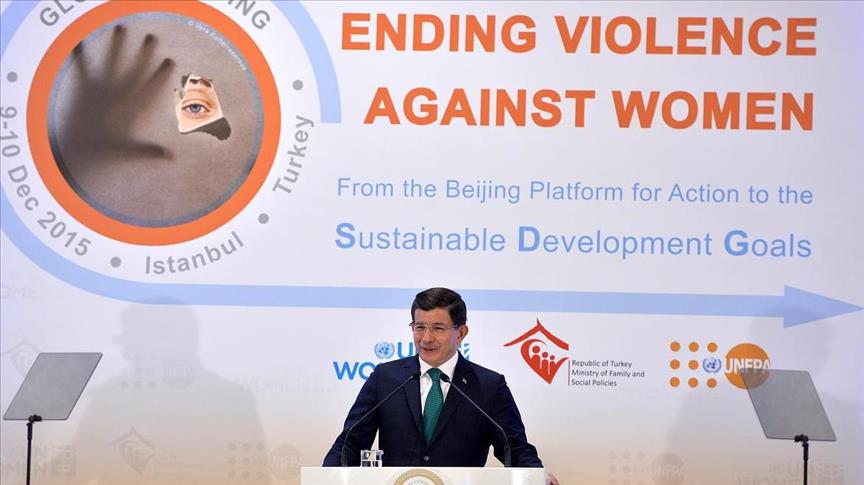
İstanbul
By Tuncay Kayaoglu
ISTANBUL
Turkey has witnessed major protests, gatherings and high-profile court decisions in recent weeks showing that efforts to tackle violence against women have taken on a new intensity in a very public manner.
At the political level, Prime Minister Ahmet Davutoglu recently used a UN-backed meeting in Istanbul to call for a "multi-dimensional fight" to end violence against women.
On the legal front, a Turkish court in the southern city of Mersin handed down aggravated life sentences to three men involved in the brutal murder of a young female university student, Ozgecan Aslan, whose death sparked outrage across the country earlier this year.
In symbolic protests, iconic Istanbul buildings such as the Maiden’s Tower and Bosphorus Bridge were colored orange in December to raise awareness of violence against women.
The month before, some women presented roses to men flocking out of an Istanbul mosque after Friday prayers, as part of an awareness-raising campaign.
Yakin Erturk, a former UN special rapporteur on Violence against Women, told Anadolu Agency that there has been a change in how officials view violence against women.
She mentioned the Turkish Prime Ministry’s 2006 memorandum that tasked “every public institutions on ending violence against women.”
That memorandum listed measures that various public offices could take in order to end violence against women. The memorandum, for example, proposed a telephone hotline for people to alert the authorities about cases of violence.
Such memoranda, while not strictly legally-binding, are issued to guide public bodies on particular matters.
The memorandum asked “every public institution and NGO” to organize campaigns “to increase awareness [of] violence against women.”
It also called for positive discrimination in employment to ensure gender equality in society and to address past discrimination which women had faced.
Sare Yilmaz, chair of the Istanbul-based Women and Democracy Association, told Anadolu Agency that NGO work was critical for the positive change on the legal front, but more had to be done: “I hope such change will translate into a mental change.”
Sema Ramazanoglu, Turkey’s newly appointed Family and Social Policies Minister, described violence against women as a “societal problem” which requires a fundamental change in attitudes to solve.
“It is not a problem that you can say, ‘Let the ministry solve this problem’. NGOs, opinion leaders, the media and family have important parts to contribute to this mental change,” she said on Nov. 30.
Although there has been increasing awareness about violence against women, there is a particular group whose agony has been largely unnoticed: disabled women.
There are over eight million disabled citizens in Turkey, according to the Istanbul-based Foundation for the Physically Handicapped.
Idil Seda Ak, an activist with the Ankara-based Disabled Women’s Association, said disabled women face “double disadvantages”.
“Being a woman with a disability make things worse,” Ak said.
Bahar Yavuz, a 22-year-old psychology student, told Anadolu Agency about a typical incident where her blindness left her vulnerable:
“I was at a metro station. One guy was trying to grab my arm and lead me somewhere else. I began to speak in English. He muttered some words in English but later went away.”
Yavuz sometimes prefers to use her physical strength to deter molesters, especially in queues waiting to get on public transportation.
She also is “tired” of explaining herself to people. Yavuz says she knows many disabled women who are insulted when people ask: “‘Where is your owner?’ or ‘Why did you go out alone?’”
“It is tiresome to go out,” she says, adding: “How many times should I explain myself or to how many people?”
Recent research prepared by the Disabled Women’s Association revealed that disabled females can face violence and abuse in Turkey.
Data compiled through the Violence Prevention and Watch Center (SONIM) showed that at least 69 disabled women applied to shelters used to support battered wives.
Forty-eight of these women have reported psychosocial problems since 2012, the SONIM report disclosed.
The association is leading a campaign with reports, including photos, showing some of the abuse and violence which women and girls with disabilities face.
However, this is a global problem. The United Nations has acknowledged that women with disabilities experience “double discrimination” which heightened the possibility of gender-based violence.
The UN’s 2006 Convention on the Rights of Persons with Disabilities recognized that women are often “at greater risk of violence, neglect or negligent treatment, maltreatment or exploitation”.
Idil Seda Ak said that awareness regarding disabled people has increased in recent years despite of the current unpalatable situation.
“We have new momentum. Disabled women have begun to express [their problems] more often,” Ak said, but adding that organizations working on disabled people – many of which are headed by men – have not properly prioritized women’s problems.
Twenty-two-year-old Yavuz complains of a lack of public empathy and awareness regarding disabled women’s problems.
Although there are public and civil society efforts to improve the conditions of disabled people and combat violence against women, the situation of disabled females, like Yavuz, has been slow to change.
Saying she wants to live in a developed, Western country rather than wait for improvement in Turkey, Yavuz adds: “I have one life, after all.”
Anadolu Agency website contains only a portion of the news stories offered to subscribers in the AA News Broadcasting System (HAS), and in summarized form. Please contact us for subscription options.

